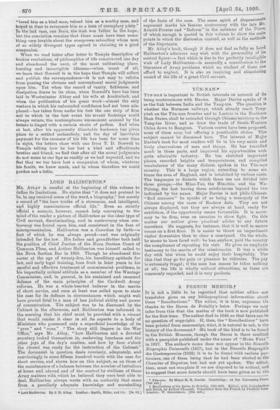Y ON-NAN.*
Y1ThI4vart is important to British interests on account of its being conterminous with Burma. Major Davies speaks of it as the link between India and the Yang-tze. The question .is whether the Burmese railways, which already reach Teng- yiieh on the Yiin-nan frontier and to Lastrio in the Northern Shah States, shall be extended through Chinese territory to the Yang-tze River, and so draw the trade of South-Western China down to Rangoon. Various routes have been proposed, none of them easy, but offering a practicable choice. This subject cannot be discussed here. The interest of Maier Davies's book for most readers will lie in his very acute and lively observations of men and things. He has travelled much in these parts, and improved his opportunities with quite admirable industry. He has sketched importaiat places, recorded heights and temperatures, and compiled vocabularies of the many dialects spoken in the Yan-nan country. This is a large region, extending 'to some six times the Area a England, and is inhabited by various races. The languages or dialects whieh these use are divided into three groups,—the Miao-Yao, the Min-chia, and the Wa- Palung, the last having three subdivisions beyond the two indicated by the name. Major Davies is not philo-Chinese. " Bad manners" be speaks of as being a monopoly of the Chinese among the races of Eastern Asia. They are not always displayed, but they are always at hand, ready for exhibition, if the opportunity seems favourable. It is neces- sary to be firm, even on occasion to show fight. On this matter our author gives practical advice tci any future travellers. He suggests, for instance, that it is well to secure rooms on t first floor. It is easier to throw an impertinent visitor downstairs than to clear a courtyard. On the whole, he seems to have fared well: he has, anyhow, paid the country the compliment of repeating his visit. He gives an emphatic testimony to the merits of the missionaries. It was a white day with him when be could enjoy their hospitality. The idea that they go for gain or pleasure he ridicules. The pay is extremely frugal; if the man has means he takes nothing at all; the life is wholly without attractions, as those are commonly regarded, and it is very perilous.






















































 Previous page
Previous page